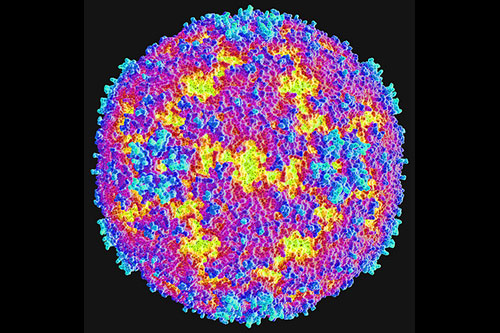
| Sept. 2014 | |||||||||||
| Top stories | |||||||||||
| In the news | |||||||||||
| Photos | |||||||||||
| Contact us | |||||||||||
| Archive | |||||||||||
|
Enterovirus D68 testing information |
Enterovirus D68 (EV-D68) is causing clusters of severe respiratory disease and is known to be in Iowa. Infection often begins with mild cold-like symptoms. Most people will recover at home within a few days.

Image courtesy of The Public Library of Science
Infants, children and teenagers with a history of asthma, other respiratory issues or immune compromised status may develop severe respiratory illness requiring hospitalization. Such patients may need to be placed on droplet plus contact isolation for the duration of their hospitalization with enforcement of visitation restrictions on younger children to prevent potential spread of disease.
The Iowa Department of Public Heath (IDPH) will arrange for testing following CDC guidelines. CDC will perform typing testing for surveillance purposes on a priority basis in the following situations:
- Hospitals experiencing increased numbers (above baseline) of admissions (especially to pediatric ICUs) due to respiratory infection. CDC is especially interested in performing typing on specimens that have already tested positive for enterovirus infection.
- Clusters of unknown respiratory illness among populations of any age that are in close contact, such as residential facilities.
The CDC recently clarified enterovirus D68 recommendations for infection control to include the following:
- Infection control guidelines for hospitalized patients with EV-D68 infection should include standard precautions, and contact precautions in certain situations, as is recommended for all enteroviruses.
- Because EV-D68 is a cause of clusters of respiratory illness similar to rhinoviruses, droplet precautions also should be considered as an interim recommendation until there is more definitive information available on appropriate infection control.
Testing in Iowa can be initiated by calling the Center for Acute Disease Epidemiology (CADE) at 800-362-2736. Upon approval, the State Hygienic Laboratory will coordinate specimen collection, completion of test request forms and submission to CDC.
Nasopharyngeal or oropharyngeal swabs are preferred, although washes or aspirates will also be accepted.
Information for the general public is available on the Hygienic Lab website at https://www.shl.uiowa.edu/news/enterovirusgeneral.xml.